SPECworkstation 3.0.2 Storage Benchmark
SPECworkstation benchmark is an excellent benchmark to test systems using workstation-type workloads. In this test, we only ran the Storage component, which is fifteen separate tests.
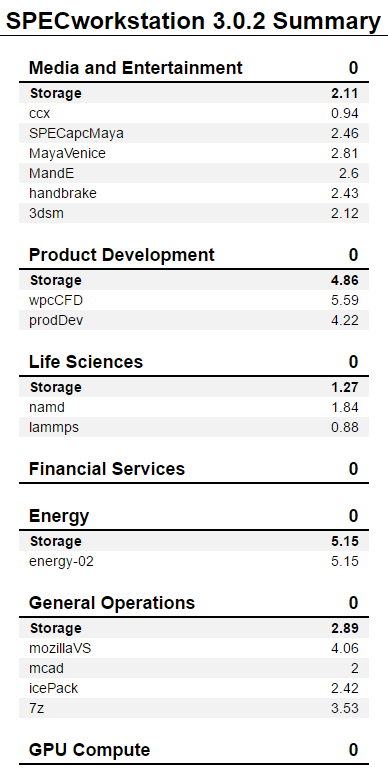
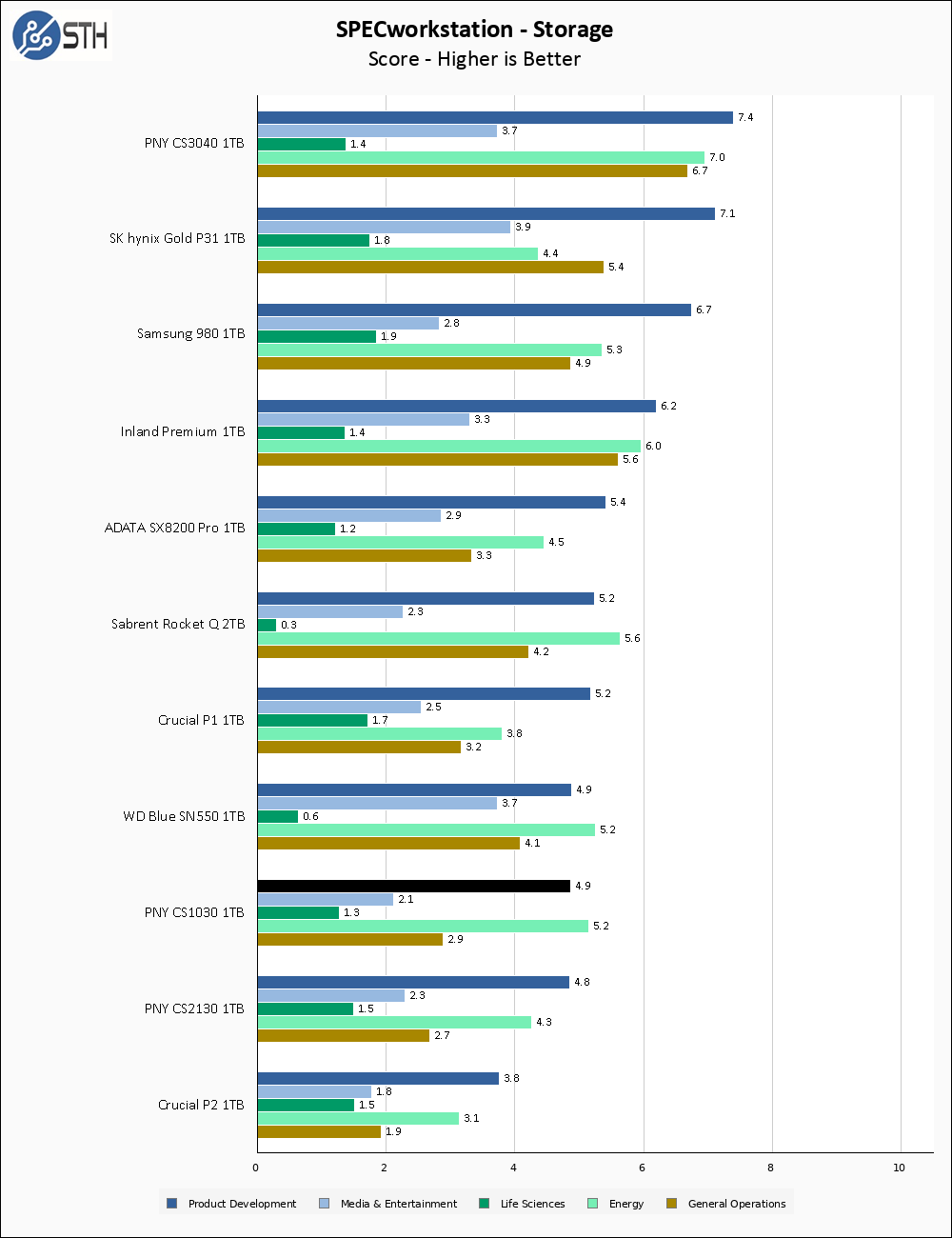
SPECworkstation performance for the PNY CS1030 1TB is unremarkable. In some benchmarks this drive is relatively competitive, in others it is not. The CS1030 wins more subtests when compared to the CS2130 than it loses, which is something to take note of.
Sustained Write Performance
This is not necessarily a benchmark, so much as trying to catch the post-cache write speed of the drive. While I am filling the drive with data to the 85% mark with 10 simultaneous write threads, I monitor the drive for the write performance to dip to the lowest steady point and grab a screenshot.
This is a new section to my reviews, and something I plan to track from now on. Since I have not been gathering this data up until recently, I do not have historical data from many of my other reviews.
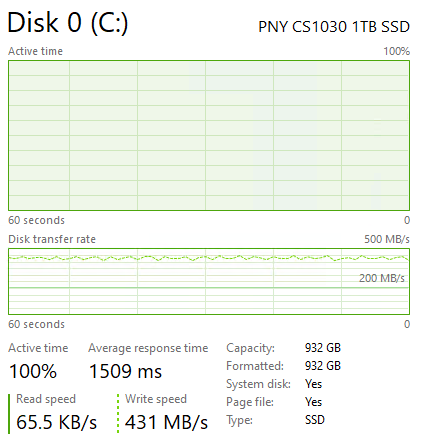
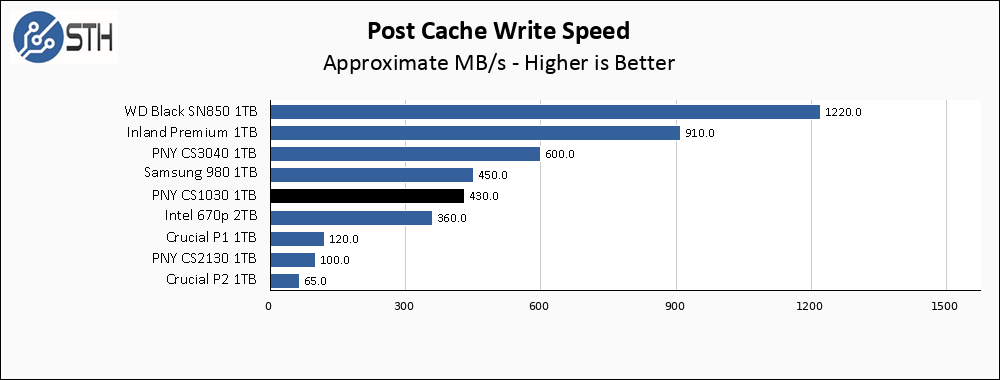
Coming in at a sustained post-cache write speed of around 430 MB/s, the PNY CS1030 1TB lands right in the middle of our chart, between the Samsung 980 1TB and the Intel 670p 2TB. Considering the entry-level nature of the CS1030, those are good drives to have as your chart neighbors. Of note here is how much better the CS1030 post cache performance is than the CS2130.
Benchmark Comparisons
As you might have guessed, we are going to directly compare the PNY CS1030 1TB to the PNY CS2130 1TB. Additionally, I will pit the drive against the venerable mainstream ADATA SX8200 Pro 1TB.
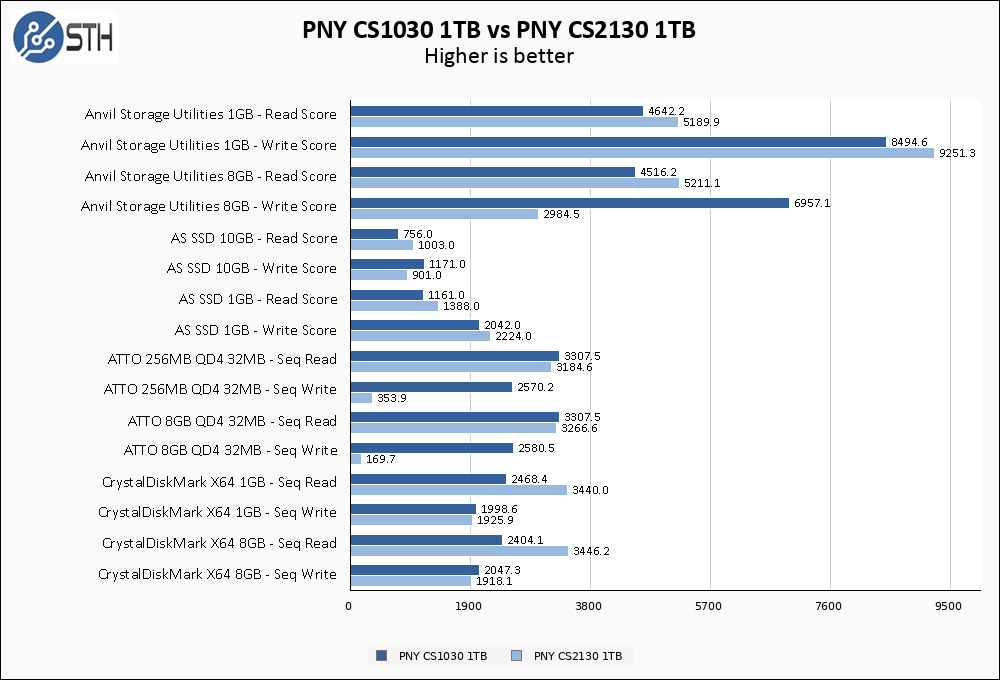
Unless you skipped to the last page of this review, you will know that the CS1030 spent a good bit of time embarrassing its more expensive CS2130 brother, and that is somewhat visible in this direct comparison. While the CS2130 does log some victories, it also turns in some horrible results particularly in some of the write benchmarks. Coupled with how badly the CS2130 performed in the post cache sustained write test, the CS1030 is by far the more consistent drive and definitely gets my recommendation between the two.
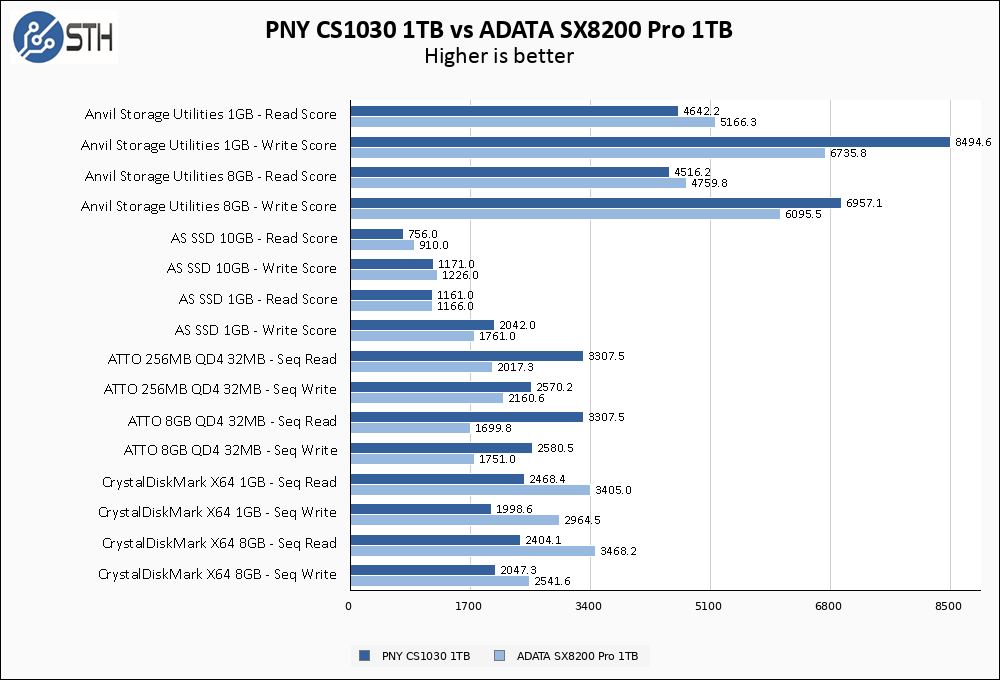
The PNY CS1030 1TB trades blows across the entire benchmark suite when compared to the ADATA SX8200 Pro 1TB. Neither drive takes a commanding lead over the other, and in general I would consider these drives to be in the same performance ballpark.
Temperatures
We monitored the idle and maximum temperature during testing with HWMonitor to get some idea of the thermal performance and requirements of the drive. Please keep in mind that our test bench is an open frame chassis in a 22C room, but with no direct airflow. As a result, this is not representative of a cramped low airflow case and is instead intended to model temperatures of a drive ‘on its own’.

Thermals on the PNY CS1030 1TB were downright chilly, peaking at a maximum of 58C.
Again, we are mostly looking for the absence of runaway thermals here during our testing rather than comparing drives to each other.
Final Words
The PNY CS1030 1TB is $105 on Amazon, which puts it into direct competition with the ADATA SX8200 Pro 1TB and the WD Blue SN550 1TB and around $10 cheaper than the PNY CS2130 1TB. The WD Blue and the ADATA SX8200 Pro are good company, and the CS1030 is a good value at that price point. If it was not obvious at this point, the CS1030 is a better drive and also costs less than the PNY CS2130.
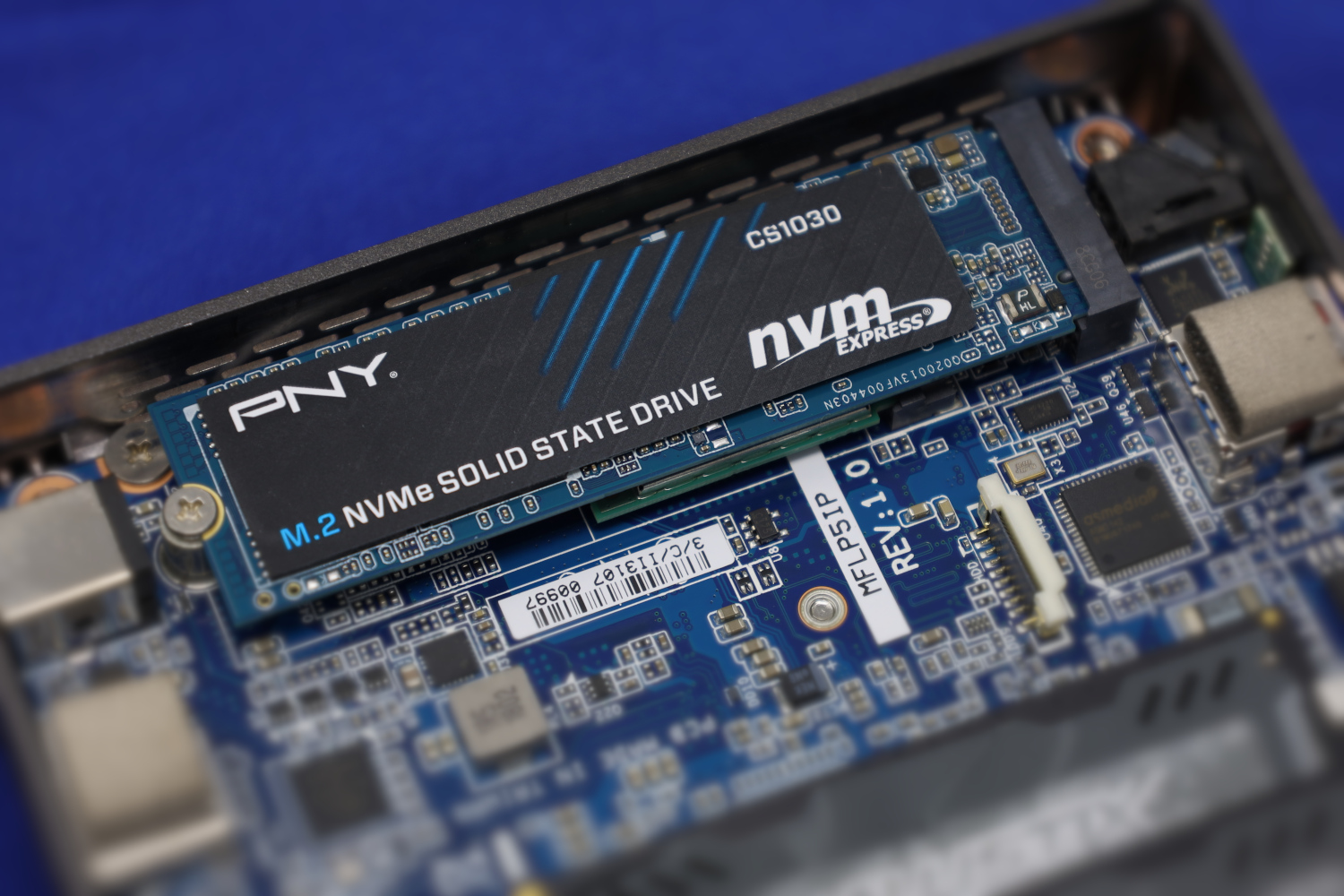
I am still holding the lack of published endurance information against the PNY CS1030; not quoting endurance on a SSD is simply unacceptable, especially in a drive marketed with a 5-year warranty. But since the drive is less expensive than the CS2130 and comes with TLC instead of QLC, I am less incensed than I was when reviewing the CS2130.
The PNY CS1030 1TB is a decent entry-level SSD, and would happily fit the bill for use in normal desktop or laptop systems where mainstream level performance is acceptable. If you are considering the WD Blue SN550 or other SSDs in that performance and pricing ballpark, then you should also consider the PNY CS1030.

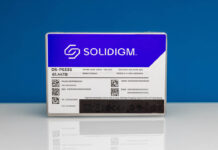
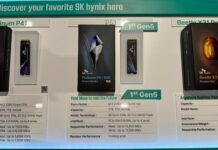
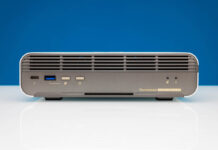
I’m honestly kind of amazed.
Not that SSDs vary widely and vendors can be pretty cagey about specs; but that PNY somehow ended up building or badging two of their products in basically the wrong order.
If they had called this one “CS2130” and the other once “CS1030”, with prices swapped accordingly, everything would have been more or less fine. But no.
Just a rebadging accident? Shocking indifference to benchmark results that they shouldn’t have much difficulty generating? Some sort of messy product lifecycle alignment that kept them from releasing the product they really wanted for the CS2130 slot but let them do something nice for the CS1030 slot?
How does it warrant a 8.5/10 with unknown/undisclosed endurance?
Todd,
Because PNY is still standing behind their 5 year warranty. In theory a 5 year warranty with no endurance enforcement is actually better for consumers than one that has an endurance clause on it.
I still want to know the endurance rating because that helps me understand the intensity of use a drive is designed to endure, as well as can help provide some idea of an ‘expected lifetime’ for a drive outside of the scope of the warranty. But from PNY’s perspective, they’re selling you a drive they guarantee will last 5 years, and there’s no reason to expect otherwise just because they do not provide an endurance rating.
Good for Chia then.
“PNY somehow ended up building or badging two of their products in basically the wrong order.”
Given that PNY are deliberately opaque both to the specifications of these devices, and to their endurance guarantees, I think it’s reasonable to ask whether either of these are actually fixed, or instead whether they depend on whatever components PNY use this week. So whilst in this round of testing the cheaper device out-performed its supposed better, who’s to say that a different pair of devices purchased in a month’s time won’t see the performance figures (and the use of TLC vs QLC) reversed ?
Without more confidence than PNY have provided that that’s not the case, I’d consider both PNY devices as a hard avoid
The endurance rating on CS1030 2TB is apparently 480 TBW. I would assume that the 1TB rating is half that (240 TBW) assuming they use the same NAND. This information comes from a manufacturer answered question on Amazon.
The endurance specs are listed on the PNY warranties page:
https://www.pny.com/company/support/solid-state-drives
https://www.pny.com/file%20library/company/support/product%20brochures/solid%20state%20drives/solid-state-drive-warranty_v5.21.2021.pdf
250GB 150TBW
500GB 110TBW
1TB 240TBW
2TB 480TBW
Yes, the 500GB has a lower absolute endurance rating than the 250GB. And yes, these are rather pitiful.
Unfortunately I think you may have missed something major. If you fill the drive, with a continuous write you will start out at 1.7GB/s … which almost immediately drops to 430MB/s … but after ~500GB (on an empty 2TB drive) you will quickly drop to 75MB/s. At least this is what I saw on my testing, and what I have seen others report too. I suspect this is a QLC drive — one would think that PNY certainly would advertise if it was TLC! The 2TB drive is currently selling for a bargain basement $200 AUD, which is a paltry $145 USD. I would suggest doing more extended continuous write testing.
I used Disk Tools by Tahionic.com to do my write filling, and DiskMark by NetworkDLS for other continous write testing.
I pulled the label off my CS1030 drive. It has QLC flash. ♂️ Come on PNY….
How can you review an SSD without mentioning TBW? This guy always misses the obvious.